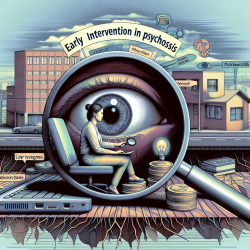Introduction
As practitioners dedicated to improving outcomes for children, understanding the nuances of early intervention in psychosis, especially in low- and lower-middle-income countries (LMIC), is crucial. The systematic review titled "Early Intervention in Psychosis and Management of First Episode Psychosis in Low- and Lower-Middle-Income Countries: A Systematic Review" offers valuable insights into how these interventions can be adapted and implemented effectively in resource-constrained settings.
Key Findings from the Research
The review highlights several critical findings:
- Adaptability of EIP Services: Early intervention in psychosis (EIP) services can be adapted to fit the cultural and resource constraints of LMIC. This includes collaboration with traditional healers and involving non-specialist healthcare professionals.
- Pharmacological Interventions: The review found that long-acting injectable antipsychotics may offer a better quality of life compared to oral antipsychotics, despite a high prevalence of metabolic syndrome among patients receiving antipsychotics.
- Non-Pharmacological Interventions: SMS reminders were shown to improve treatment engagement, highlighting the potential of mobile technology in these settings.
Implementing Research Outcomes
Practitioners can enhance their skills by integrating these findings into their practice. Here are some steps to consider:
- Cultural Adaptation: Work with local cultural and spiritual leaders to create a collaborative care model that respects traditional beliefs while integrating modern medical practices.
- Utilize Technology: Implement mobile technology solutions, such as SMS reminders, to improve patient engagement and adherence to treatment plans.
- Family Involvement: Engage families in the treatment process to enhance support systems and improve outcomes for patients.
Encouraging Further Research
While the review provides a foundation, there is a need for further research to explore the cost-effectiveness of EIP services in LMIC and to develop tailored interventions that address specific cultural and resource challenges. Practitioners are encouraged to contribute to this body of research by documenting and sharing their experiences and outcomes.
Conclusion
Early intervention in psychosis is a promising approach that can be adapted to various settings, including LMIC. By leveraging cultural insights, technology, and family support, practitioners can improve outcomes for children and young adults experiencing first-episode psychosis.
To read the original research paper, please follow this link: Early Intervention in Psychosis and Management of First Episode Psychosis in Low- and Lower-Middle-Income Countries: A Systematic Review.










